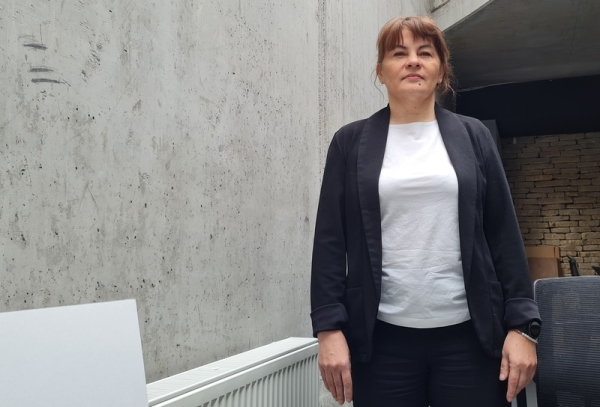Polish abortion rights activist vows to appeal case
Polish abortion rights activist Justyna Wydrzyńska is angry.
Last week, she was found guilty of helping an abused woman seeking to terminate a 12-week pregnancy after sending her abortion pills.
"I’m so angry, I’m so angry because of this," she told a small group of reporters at the Amnesty International office in Brussels on Thursday (23 March).
Taking or being in the possession of abortion pills in Poland is not the problem. But sharing them is.
"This is the absurdity of the law," said Joanna Erdman, law professor at Dalhousie University, speaking alongside Wydrzyńska.
Wydrzyńska has since been sentenced to 30 hours of community service per month for eight months.
The case has received widespread attention, sparking a precedent in Poland in a wider state crackdown on human rights defenders and rule of law.
The ramifications, ahead of parliamentary elections later this year, are also playing out in Polish media and a government led by the right-wing nationalist Law and Order (PiS) party.
Poland in January 2021 slapped an almost total ban on abortions. That same year, Poland officially carried out around 100 abortions — in a population of 38 million.
Not long afterwards, a Polish woman pregnant with twins died after doctors refused to perform an abortion. Although one foetus had perished in the womb, doctors refused to remove it citing abortion legislation.
The second foetus died in the womb a week later. Then the mother.
Without access to state health services, many are now seeking out the activists for help and advice.
"With each restriction, our phones, our emails, receive triple as much traffic," said Kinga Jelinska, a Polish activist working with Wydrzyńska.
Wydrzyńska and others in Poland are part of the Abortion Dream Team, a network helping women get abortions.
This includes Ukrainian women have been given refuge in Poland, some likely to have been raped by Russian soldiers, says Natalia Broniarczyk, another Polish activist working with Wydrzyńska.
Ukrainian women in Poland
Broniarczyk says over 2,000 Ukrainian women in Poland in the past 12 months approached them for an abortion.
Like other Polish women seeking help, most were given Mifepristone. The drug comes as a pill, sent in from abroad. Others with complications or foetal abnormalities are flown to places such as the Netherlands or Belgium.
"Who deals with this crisis? Belgian doctors, French doctors. So we actually export our problem," said Broniarczyk.
Over the span of a year, the activists says they helped over 40,000 women in Poland get an abortion. Another 100 are sent abroad to a clinic every month. Of those some 60 are due foetal abnormalities, they say.
The appeal
Wydrzyńska’s court case is far from over, and she intends to appeal. But given the composition of the judges, the verdict is likely to stand, she said.
She says the judge that sentenced her last week had been appointed by PiS and was then immediately promoted to the higher level court that deals with appeals.
But once the domestic legal avenue is exhausted, she will go to the European Court of Human Rights.
Although the European Commission will not comment on Wydrzyńska’s case, the larger spat over the independence of Poland’s judicial system has seen the European Court of Justice issue it daily €1m fines.
Wydrzyńska says her activism in Poland is limited to answering emails and telephone calls from women in need of help. "We don’t send pills around Poland. It’s not our job because we know the Polish law," said Wydrzyńska.
But she made an exception with Anna [not her real name], in February 2020. Anna was 12-weeks pregnant and in an abusive relationship.
A victim herself of domestic abuse, Wydrzyńska decided to act. "It was the reason why I shared the pills because I really see the same, the same story in my life," she said.
Anna had since written a letter, shared with Wydrzyńska. In it, Wydrzyńska says Anna writes that she had been abandoned by family and doctors.
"Maybe there will be a moment she will decide to share the story," said Wydrzyńska. "But we know that she’s fine."

